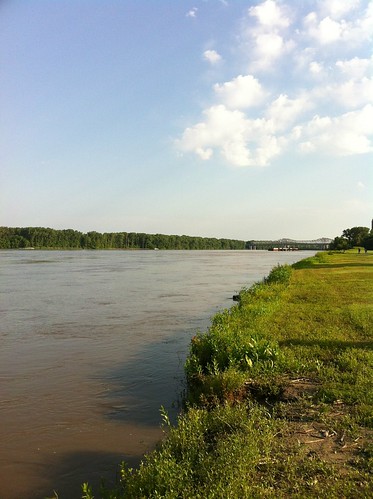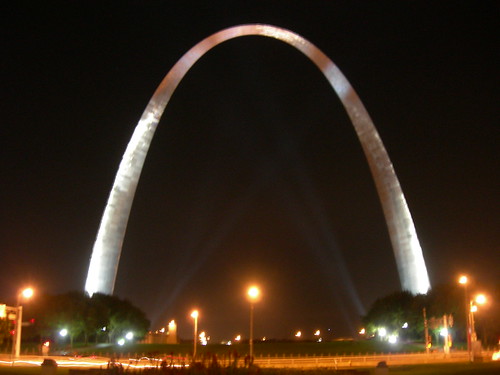I grew up in the sticks. The high school I went to was small (I graduated in a class of 50) in a small town (pop. 2000), but that's not where I grew up. I grew up outside of "town," unincorporated land that didn't have its own city limits. We had acres of land, much of it woods, and there weren't really neighborhood kids to play with because there wasn't really a neighborhood. There were gravel roads and ponds and trees and cows. I wasn't a farm kid, but we did have a menagerie of animals at one time or another: a horse, some goats, some chickens and ducks, pigs, dogs, cats, guinea pigs, hamsters, gerbils, and even an aquarium of hissing cockroaches. I grew up surrounded by nature and loved it.
Later in life, my father and I would grow into a very strained relationship, but early on, we were connected by the land, by the rural lifestyle. We would garden and "hunt" (which meant I carried around a BB gun and scared away all of the rabbits he was theoretically trying to shoot). He taught me how to identify edible plants and clear brush to make paths through the trees. I went to school with scabbed knees and scratched legs. We climbed trees, swam in muddy water, and fell asleep under the stars. He taught me to fish, to mark trees so I could find my way back to the path if I wandered off course, and to appreciate the wonder of the natural world.
It's interesting, though, because this world was not the one my father grew up in. In fact, he grew up not too far from where I now live. His parents were children of immigrants (German and Italian) who ran bars near one another in St. Louis. Once they married, they stayed in St. Louis with their children until--like most Midwest cities--the urban problems became too much for them. My father left high school at the age of 16, and he told me tales of gang wars and bloodshed, violence his parents were unwilling to accept. Eventually, they moved to the country, and my father finished high school two years late.
To him, the country was a haven, an escape from the violence and trouble that marred his childhood. Almost all of his stories were negative, and I remember--when I was first choosing to move to the city with my own family--wondering what he would think of it.
After all, I was once his little girl, a child that he had coached to repeat the maxim "You can take the girl out of the country, but you can't take the country out of the girl."
But I know his time in this city was not all bad. I've heard the stories his relatives have shared. I've seen the pictures. He had a life here, and so do I.
It's not that I hated the country. In fact, there are parts of it I sorely miss: the brightness of the stars in the absence of the city glow, the sounds of the spring peepers announcing the warmer weather, the expanse of lush grass beneath my feet, and the peace of solitude.
But that life is not for me. I--despite being an introvert--thrive off of being around people, and for me that means being in a place with diversity. I don't just mean racial diversity, though as the mother of a biracial child, that is important to me. Growing up, my exposure to the world was very limited; my lens was narrow. It wasn't until I knew that there were other ways to see that I found my own vision, and I never would have been able to do that if I hadn't left the enclosure (and maybe even the safety) of my small town.
It's ironic. My father and I have inverted paths. He spent his entire childhood in the city, growing more and more frustrated with the problems of urban living, and then he escaped to the country and considered it an oasis that opened a different part of his soul. He took up gardening and hunting. He wanted the rural life to soak into him and his family.
I spent my entire childhood in the country, growing more and more frustrated with the limitations of rural living, and then I escaped to the city and considered it an oasis that opened a different part of my soul. I walk on paths of concrete through manicured parks and explore quaint cafes. I want the city life to soak into me and my family.
In the end, I think our weaving paths demonstrate a similarity we share (because--despite the problems we had in our relationship--I do see myself in him sometimes): we are passionate about our perspectives, and we must live them fully. Where I live is a part of who I am, and while I can adapt to many things, being in the midst of a vibrant urban community makes me most alive, just as silently fishing alone in the early morning dawn made him. I think that, if he were alive today, he would understand.
Photo Credits: ChrisYunker, jimmywayne



This is great to read. Right now, we live in a very small town -- a farm town, really -- between one small city and one medium city. And while it's fairly idyllic for our girls, I really worry about raising them in such a bubble of whiteness and sameness. I am fine with it for now, but I want to be in a more diverse area by the time my oldest hits junior high. But, I do love living near lakes, trails, open sky, and the insane trust we have in our community is pretty wonderful.
ReplyDeleteI definitely don't think there are any simple answers in the where to live decision, and I do wish we had a community we could trust a little more. In the end, I think there's always going to be a touch of the-grass-is-always-greener to it no matter what.
Delete